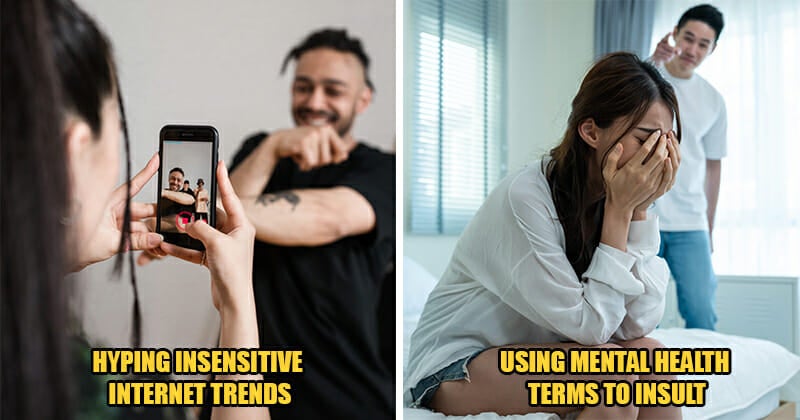Advancement in information technology has contributed to growing public interest and awareness regarding mental health.
While increased mental health literacy can benefit the community, this phenomenon also gives rise to some common mistakes that can do more harm than good!
1. Misusing terms related to mental health
More often than not, mental health terms are misused and many are not aware of their harmful effects:
- “Arrange nicely please, I’m a bit OCD.”
- “Don’t ask me to sing in public again, I’m traumatised.”
- “Why you so bipolar one? You came smiling and now you’re crying.”
- “I hate job interviews. They give me anxiety.”
These statements undermine the severity of mental illnesses and portray them merely as exaggerated descriptions instead of clinical diagnoses. People battling mental illnesses are misrepresented and minimised, which perpetuates the existing stigma around mental health.
What to do instead: Equip ourselves with accurate knowledge about mental illnesses and use mental health terms sensibly. Say what we really mean (e.g. “I hate job interviews. They make me so nervous!”).
2. Using mental health-related insults
Instead of resolving conflicts, insults leave emotional scars. Needless to say, using mental illness-related terms to insult is also a complete no-go:
- ‘“If you can’t think straight, go to therapy!”
- “Can you stop being so hysterical?”
- “He spent an hour styling his hair? What a narcissist!”
Using these terms to insult paints mental illness in a negative light by equating them to unfavourable behaviours. This prevents healthy discussions about mental health and possibly discourages individuals from seeking psychological help.
What to do instead: Engage in healthy debates without personal attacks or Ad Hominem. Focus on resolving conflicts and not insulting or blaming.
3. Spreading toxic positivity quotes
To cheer someone (or ourselves) up, many turn to motivational quotes on the internet. While some quotes are meant to spread positivity, they can be insensitive and toxic:
- “What doesn’t kill you makes you stronger!”
- “Look on the bright side, every cloud has a silver lining.”
- “Everything happens for a reason. God will never give you more than you can handle!”
- “Love yourself first, so others can love you.”
Toxic positivity quotes stall healing and problem-solving by invalidating difficult emotions (e.g. despair, anger, regret). When these emotions are deemed “undesirable”, it fuels shame and guilt among those who are struggling, thus encouraging suppression.
What to do instead: Normalize the expression of all emotions without labelling them as “positive” (desirable) or “negative” (undesirable). Eliminate the need to feel “better”, learn to regulate emotions and offer support using more effective methods.
4. Manipulating mental health concepts
While online resources about mental illness can educate many, some tend to exploit mental health concepts for their benefit:
- “I don’t talk about my mistakes. This is my boundary.” > an excuse to escape difficult discussions
- “I don’t drink, so you shouldn’t drink either.” > boundaries become tools to exert control
- “You made me do this. Stop gaslighting me.” > to play the victim and shift the blame
Doing so is extremely selfish and manipulative as it defies the listeners’ realities, limits their choices, and disregards their needs. Besides harming interpersonal relationships, this also demonises mental health concepts and reinforces existing stigmas.
What to do instead: Call out those who manipulate mental health concepts. Invite them to engage in a healthy discussion about mental health and urge them to use the terms correctly.
5. Following insensitive internet trends
To keep up with the everchanging trends on social media, many tend to hype insensitive internet trends without realising it:
- Mugshot makeup challenge: Glamorises violence, triggers survivors of physical abuse
- Toxic beauty trends (e.g. Kylie Jenner Lips, A4 waist, #sideprofilecheck): Fuel anxiety and self-hate, promote unrealistic beauty standards
- Traumatising pranks (e.g. #ghostprank, invisible prank): Trigger anxiety or past traumas, a form of emotional abuse
- #TraumaDumping: Disregards listeners’ boundaries and mental capacity
@mtvmcribs do YOU have a favorite traumatic memory?? #trauma ♬ original sound – ben
What to do instead: Be mindful when posting online content. Identify harmful social media trends and speak up against them to raise awareness.
6. Glamorising mental health issues
Speaking of insensitive internet trends, youngsters nowadays have an alarming tendency to glorify mental illness online:
- Self-diagnose and fake mental health issues to look cool or appear special
- Mememify mental illness to mock mental health struggles
- Romanticise mental illness (e.g. use #anxietyqueen, say “pretty girls don’t eat”, create aesthetic videos or accounts about mental illness)
Glamorising mental health issues diminishes and oversimplifies the real struggles of individuals who are battling mental illness. It reduces mental health issues to fashionable personality traits that can be depicted through dark humour, quotes, and grayscale images.

What to do instead: Seek mental health resources from reliable websites and refrain from spreading unverified information online. Acknowledge that mental health struggles are intense and multifaceted.
Don’t get us wrong—it’s undoubtedly motivating to see that mental health awareness is on the rise, be it through day-to-day conversations or educational content online! However, it’s important to address our mistakes while raising awareness, so that we can cultivate a safer space for those who are battling mental illness.
What else do you think we can do as mental health allies? Share your thoughts in the comments below!
*Online content is not therapy. If you need mental health support, seek professional advice.
Also read: 5 Other Mental Illnesses M’sians May Suffer In Silence Other Than Depression & Anxiety





































